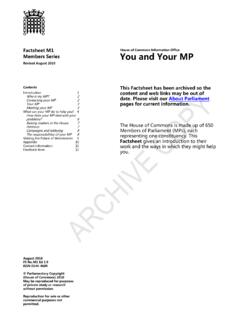Transcription of Letter from Visa regarding service disruption, 15 …
1 VISA Charlotte Hogg Chief Execulive Of(irer, Europe The Rt Hon. Nicky Morgan MP Chair of the Treasury Committee House of Commons London SW1A OAA 15 June 2018 Dear Chair, Thank you for your Letter dated 4 June 2018 regarding the partial service disruption that prevented many cardholders from using Visa's European systems for payments on Friday 1 June. We appreciate the opportunity to address this important issue in detail, including our response to your questions below. We do absolutely hold ourselves accountable to the consumers and merchants who use our cards. In this instance, we failed to meet your and our own expectations, and we apologise again unreservedly to everyone who was affected by the incident. Visa, together with our financial institution partners, has quickly implemented a compensation programme for cardholders in response.)
2 The integrity of payment systems is vitally important to the UK economy and, to this end, we are regulated by the Bank of England and the Payment Systems Regulator. Visa holds itself to the highest standards with respect to the performance of our systems, and we aim to exceed the expectations of cardholders, merchants, financial institutions and other stakeholders. We also understand the role of our system in supporting commerce throughout Europe. As Visa lnc.'s global Chief Executive Officer recognised publicly on the day of the incident, we fell short of our goal of ensuring that Visa payments work reliably 24 hours a day, 365 days a year. In this Letter , we aim to provide you with full and complete responses to your questions.
3 We focus on what occurred, how we mitigated and are continuing to mitigate potential impacts to consumers and other stakeholders, and what we are doing to prevent any reoccurrence or similar incident. We first summarise the incident below, and then address the questions of the Committee. On Friday 1 June, our UK processing systems were disrupted such that many UK consumers were unable to complete transactions using their Visa debit and credit cards. The incident began at 14:35 British Summer Time and ended at 00:45. At its peak, the disruption affected people in the midst of returning home from work, socialising in restaurants and pubs, and doing end-of-day shopping. We take seriously our important role in supporting financial stability in the UK.
4 A disruption to our processing that impacts consumers at any time is unacceptable, let alone during a busy Friday afternoon. Visa Europe Visa Europe Limited Registered in England PO Box IC 39662 Phone +44 (0) 207 937 8111 London W2 6WH To assist the Committee in understanding fully th e incident, we think it would be helpful to provide further detail on Visa's role in the payments ecosystem. Visa connects the financial institutions that issue cards to their customers (issuers) with other financial companies who ensure that merchants are able to safely connect to the network (acquirers). We have provided detail on Visa's role in the payment ecosystem in an appendix. The Incident and Vi sa's Response At 14:35 on Friday 1 June, our UK data centre operations team became aware of a partial degradation in our processing system.
5 We immediately took steps at our data centres to attempt to remedy the issue and initiated a response based on protocols we have in place for addressing any type of critical incident; the first step was a Technical Response Team assessment meeting. Soon thereafter, we escalated the matter in alignment with our crisis management protocol. Ninety minutes after our first indication of a systems issue, and having confirmed the underlying facts as part of our crisis management protocols, we provided a public statement to the media. Our number one priority was to focus our resources on identifying the root cause and implementing a variety of solutions to get the system back to full capacity. By way of background, we operate two redundant data centres in the UK, meaning that either one can independently handle 100 percent of the transactions for Visa in Europe.
6 In normal circumstances, the systems are synchronised, and either centre can take over from the other immediately. The centres communicate with each other through messages regarding the system status, in order to remain synchronised. Each centre has built into it multiple forms of backup in equipment and controls. Specifically relevant to this incident, each data centre includes two core switches (a piece of hardware that directs transactions for processing) - a primary switch and a secondary switch. If the primary switch fails, in normal operation the backup switch would take over. In this instance, a component within a switch in our primary data centre suffered a very rare partial failure which prevented the backup switch from activating.
7 As a result, it took far longer than it normally would to isolate the system at the primary data centre; in the interim, the malfunctioning system at the primary data centre continued to try to synchronise messages with the secondary site. This created a backlog of messages at the secondary data centre, which, in turn, slowed down that site's ability to process incoming transactions. Due to this complexity and the very rare partial failure of the switch, a number of key steps were taken throughout the afternoon - including turning off software applications at the primary site and cleaning up message backlogs at the secondary site by both manual and automatic means. It took until approximately 19:10 to fully deactivate the system causing the transaction failures at the primary data centre.
8 By that time, the secondary data centre had begun processing almost all transactions normally. The impact was largely resolved by 20:15, and we were processing at normal service levels in both data centres by Saturday morning at 00:45, and have been since that time. Page 2 The service disruption lasted from 14:35 to 00:45. This length of time was clearly unacceptable. However, at no time during the incident was there a full system outage. Instead, throughout the period of disruption, the percentage of transactions that failed to process fluctuated. Over the course of the entire incident, 91 percent of the transactions of UK cardholders processed normally; approximately 9 percent of those transactions failed to process on the card holder's first attempt.
9 There were two periods of peak disruption: the first for ten minutes (15:05-15:15), the second for 50 minutes (17:40-18:30), during which an average of 35 percent of transactions failed to process for UK cardholders. Over the remainder of the incident (excluding the peak periods), the rate of failed transactions in the UK was closer to 7 percent on average. Our analysis of the data shows that many cardholders retried the same transaction at least once during the incident. When this is taken into account, the 9 percent rate of transactions that failed to process properly over the entire incident window for UK cardholders falls by approximately half. For clarity, we use the term "failed to process" to refer to two circumstances: either when Visa's system did not respond within required time limits (generally 10-15 seconds) so the transaction "timed out", or the transaction was improperly declined due to a Visa system error.
10 It is important to note that, at any time, some cardholders may experience a declined card as a result of fraud and risk monitoring tools, incorrect information such as an expired card, or insufficient funds to complete the transaction. Given that consumers may have access to another payment brand's credit or debit card, cash, or Faster Payments, many more purchases are likely to have been completed. For context, we estimate that 40 percent of debit cardholders in the UK also carry a credit card from MasterCard or American Express. Regardless, we fully realise the level of frustration and inconvenience created for our cardholders. We provide further detailed data on the impact of the incident in responses to your questions below.















